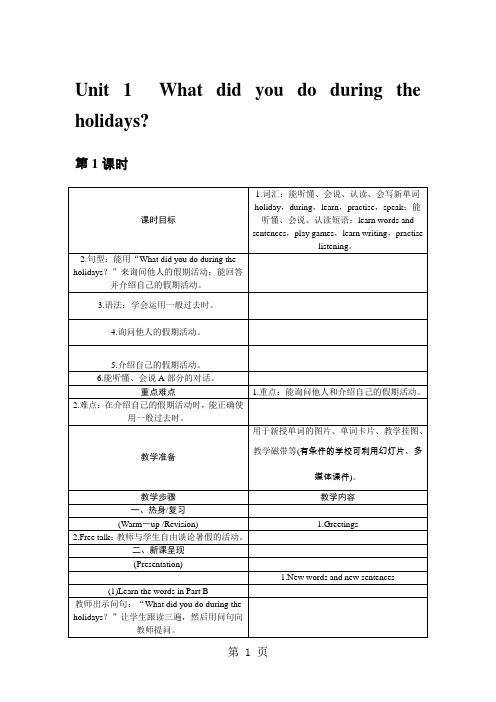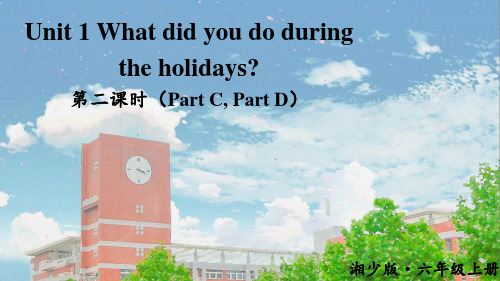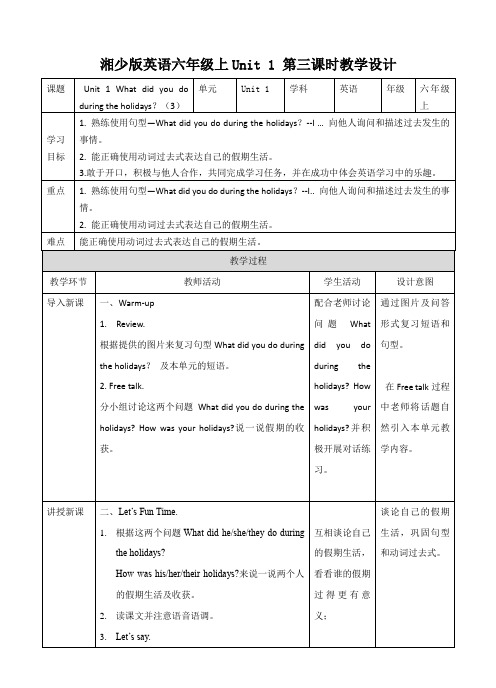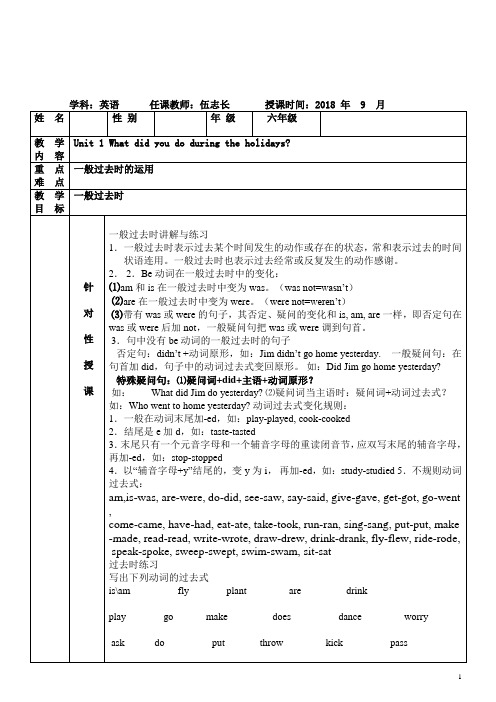新湘少版六年级一单元what did you do during the_holidays第一课时
六年级上册英语教案Unit 1 What did you do during the holidays湘少版-最新学习文档

三、新课呈现
(Presentation)
(续)
给两分钟时间让学生快速记忆以上短语,然后遮住所有的短语,让学生说出短语来。说出短语最多的学生将是班级记忆小达人。
最后再次朗读一遍所有的短语,加强学生对短语的学习和记忆。
2.The dialogue
课文学习:教师可分步骤循序渐进地引导学生熟悉课文。
(1)Listen and answer
What did Anne do during the holidays?
What did Mingming do during the holidays?
(2)Listen and number
教师将课文中的句子打乱顺序,在课件中出示或做成句子卡粘贴在黑板上。然后让学生听课文,并根据所听的内容进行排序。
4.询问他人的假期活动。
“教书先生”恐怕是市井百姓最为熟悉的一种称呼,从最初的门馆、私塾到晚清的学堂,“教书先生”那一行当怎么说也算是让国人景仰甚或敬畏的一种社会职业。只是更早的“先生”概念并非源于教书,最初出现的“先生”一词也并非有传授知识那般的含义。《孟子》中的“先生何为出此言也?”;《论语》中的“有酒食,先生馔”;《国策》中的“先生坐,何至于此?”等等,均指“先生”为父兄或有学问、有德行的长辈。其实《国策》中本身就有“先生长者,有德之称”的说法。可见“先生”之原意非真正的“教师”之意,倒是与当今“先生”的称呼更接近。看来,“先生”之本源含义在于礼貌和尊称,并非具学问者的专称。称“老师”为“先生”的记载,首见于《礼记?曲礼》,有“从于先生,不越礼而与人言”,其中之“先生”意为“年长、资深之传授知识者”,与教师、老师之意基本一致。
Ss read the phrase“learnt words and sentences”after T.Then,read by themselves.
湘少版六年级英语What did you do during the holidays课件

Do a survey. 学生调查。
Name What did you do during the holidays?
Then give a report to the class.
D Let's Read
Listen and answer. 1. What did Tim and Dino do in the class? 2. What happened to Dino when Tim says
+y”,变y为i再加-ed try
tried
动词过去式变化规律
动词原形
过去式
重读闭音节结尾, 且词尾只有一个辅 音字母,双写这个 字母再加-ed
stop, plan
stopped, planned
不规则变化
go, have, buy
went, had, bought
I visited my grandparents.
“Simon says, ‘Stand up’”? 3. Did Dino take out his book when Tim says
“Take out your book”?
Listen to the tape and read after it. Then circle the past tense of the verbs in the passage. Last week, Tim and Dino played an interesting game in class. Tim said, “Simon says, ‘Stand up!’ ” Dino stood up. Tim said, “Simon says, ‘Sit down!’ ” Dino sat down. Tim said, “Take out your book.” Dino did not take it out.
湘少六年级上册英语Unit 1 What did you do during the holidays

3. What did you read? I read _E__n_g_li_s_h_b_o_o_k_s_______.
4. What did you listen to? _I_l_is_t_e_n_e_d_t_o_m__u_s_ic_._________.
5. What did you write? _I_w__ro_t_e__a_s_to_r_y_.____________.
Let’s learn
learn words and sentences 学习单词和句子
play games 玩游戏
learn writing 学习写作
practise listening 练习听力
practise listening练习听力
practise 意为“练习”,既可以做及物动词也 可以做不及物动词,作及物动词时,后面可以接名 词或动词-ing。
c. 末尾只有一个辅音字母的重读闭音节单词,双写末尾的 辅音字母,再加ing。 例如:stop— stopping sit— sitting
d. 以ie结尾的动词,把ie改为y,再加ing。
例如:die— dying lie— lying
2. What did you do during the holidays? 假期期间你做了什么?
3. I learnt writing. 我学习了写作。 learn from意为“向……学习”。 例:我们必须互相学习。 We must learn from each other. learn to do sth.意为“学习做某事”。 例:他在学习开车。 He’s learning to drive a car.
肯定回答:Yes, I(you /he /she /they) did. 否定回答:No, I(you /he /she /they) didn’t.
湘少版六年级英语What did you do during the holidays课件

learn words and sentences
play games
practise practise listening
during
learn writing
holiday
learn
Guess and say. What did you do during the holidays?
_H_e__r_ea_d__m__a_n_y_b_o_o_k__s _d_u_r_in__g_t_h_e_h_o_l_id__a_y_s._ 3. played, I, with, games, friends, my (.)
_I_p_l_a_y_e_d_g_a_m__e_s_w_i_t_h_m__y_f_r_i_en__d_s._________
Goo(d) morning, Mingming. Gla(d) to see you again.
Find the past tense of the verbs in the conversation.
What are you reading?
I’m reading an English storybook. I rea(d) many books during the holidays.
I wrote a little storybook.
True and false.
1. The students are talking about their wsiunmtemr er holidays.
2. Mingming read many books during the holidays. 3. Anne wrote a storybook in CEhnignleisshe during the
小学英语湘少版六年级上册《Unit 1 What did you do during the hol

湘少版英语六年级上Unit 1 第三课时教学设计
仿照Fun Time说一说你的假期是如何度过
的?过得怎么样?
三、Let’s write.
1. Choose and write.
教师播放备选词汇并要求学生读一读。
读句子并选择正确的词汇补全句子。
同桌两人一组练习对话。
2. Write down your answers.
根据自己的实际情况补全对话,并和同伴进行对话练习。
四、Do a survey.
请设计一个调查表,调查同学暑期进行的活动,找出大家暑期最常做的活动。
五、Practice
用所给单词的适当形式填空。
1.We _____ (have) happy summer holidays.
2.I _____ (learn) many words last term.
3.We ________ (not do) homework last night.
4.He _______ (visit) his father three days ago.
六、Summary
复习巩固句型
--What did you do during the holidays?
--I watched TV.。
湘少版小学英语六年级上册《Unit1 What did you do during the holidays 》word教案新部编本

教师学科教案[ 20 – 20 学年度第__学期]任教学科:_____________任教年级:_____________任教老师:_____________xx市实验学校Unit 1 What did you do during the holidays?Period 1一、Teaching aims1. Enable the Ss listen, read, say and write the new words: learn words and sentences, , learn writing and price listening.2. Enable the Ss be familiar with the past tense.3. Sentence: What did ...do during the summer holidays?二、Teaching emphasis: Enable the Ss listen, read, say and write the new words and talk about the past events.三、Teaching difficulties: Enable the Ss be familiar with the pas t tense.四、Teaching tools: Tape, pictures五、Teaching method Oral method六、Teaching steps:Step 1 Warming up1. Greetings and . Simon says: word list-, learn, write, talk, li sten, do, have, go, take, read, speak, teach and holidays.2. Make a conversation with the Ss. T: Glad to see you again. Ss: Glad to see you too. T: What did you do during the summer holidays? Ss: I went toHainan…Step 2 Presentation and drill1. Show the picture of “learn words and sentences”. T: This isa picture of Mingming during the summer holidays. What did he do? Ss: He is learning words and sentences.T: He is not doing it now. He learnt words and sentences during t he summer holidays.2. Learn the other words in the same way.3. Read together.4. Little teacher.Step 3 PriceT: He learnt words and sentences. They ed . She learnt writing. H e practised listening. (Action) learn words and sentences, play games, learn writing and practice listening…3. The Ss act and say.4. Listen to the tape of Part A and then answer these questions. What Anne do during the summer holidays? What did Mingming do during thesummer holidays? 3. Listen and repeat.5. Act it out.Step 4 Consolidation 1. Evaluation. 2. Do Ex. 3.Homework. Copy the new words. Design of the blackboard:Period 2一、Teaching aims:1. Enable the Ss listen, read and say the dialogue;2. Enable the Ss the sentence pattern: What you do during theholidays?3. Enable the Ss master read the short passages and judge True or False.二、Teaching emphasis: Enable the Ss listen, read and say the dia logue;三、Teaching difficulties: Enable the Ss master the sentence patt ern: What did you do during the holidays?四、Teaching tools: Tape, pictures五、Teaching method Oral method六、Teaching steps:Step 1 Warming up1. Greetings.2. Act and say. 1). (Action) learn words and sentences, , learnwriting and price listening… 2). Tom: I played games. Ss: Tom pl ayedgames. …Step 2 Presentation and drill 1. Listen to the tape and learn the Word Bank. What you do during the holidays? I read many book s. I vis ited mygrandparents. I played games with my friends.Step 3 Practice1. Listen to the tape and repeat.2. Pair-work.3. Group-work .Step 4 Let’s Read1. Read the short passage and then judge True or Flase.2. Read the passage again and underline the key sentences.3. Check the answers.Step 5 Consolidation1. Evaluation.2. Do Ex3. Homework. Design of the blackboard:Period 3一、Teaching aims:1. Enable the Ss talk about their holidays.2. Enable the Ss and write down their holidays.二、Teaching emphasis: Enable the Ss describe their holidays.三、Teaching difficulties: Enable the Ss to talk about and write down theirholidays四、Teaching tools: Tape五、Teaching method Oral method六、Teaching steps:Step 1 Warming up1. Greetings.2. Read Part A together.3. Step 2 Presentation and drill1. Ask students to talk about their summer holidays and then let them finish Part E: write down your answers2. Check the answer.3. Ask two Ss to talk about their answers.Step 3 Let’s Have Fun1. Class work. Look at the pictures, describe Mingming’s and Ann e’s holidays.2. Class work. describe your holidays.Step 4 Consolidation1. Do Ex. Work book Unit 1.2. Evaluation3. Homework. Revise Unit 1. Design of the blackboard:2、Katie always gets up early. Period 1Teaching aims.1.The aims of knowledge:Learn these new words: wake up; make the bed; wave; late always; usually; often; never.2. The aims of skills:a. Ss can understand the four –skill words: wake up; make thebed; wave; lateb. Ss can understand the words: always; usually; often; never.c. Ss can describe the other’s actions.3.Emotion, attitudes and valueTo form the health living habitMain points and difficult point:The students master the words: wake up; make the bed; wave; late; always; usually; often; never.Teaching method and Learning way:TPR; T ask-based method; Discussing Teaching aids : Cards, tape ,r ecord, picturesTeaching Process: Step 1 Warming up a. Greetings.b. sing a song: London Bridge is falling downc. Free talk. Talking about my day.Step 2 Reviewa. Game—Guess ,guess, guessUse the cards to go over the wordsb. Retell the story—Unit 1Step 3 Presentationa. Learn the words and expressions:wake up; make the bed; wave; late At first show the learned word: cake .Let the studentsread the word, then write the words carefully.From above to find out the rules of pronunciation and memory word s.Wake up.e.g. a. What time do you usually wake up?b. I usually wake up at 6.make the bede.g. a. Do she make the bed in the morning?b. The first thing he does after getting up is to makethe bed.wave a greeting挥手致意late.e.g. I’m latelate autumn暮秋, 深秋get up late睡懒觉 wave good-bye to sb. 挥手告别b. Let the students understand frequency Adverbs(频率副词):always often usually never alwaysRead these words several times and try to remember them. At the s ame time, explain the meanings of different adverbs of frequency.100% alwaysI always stay at home in the evenings.90% usuallyI usually wake up early.80% oftenHe often goes to school on foot.0% neverHe never goes to school late.Step 3. PracticePractice the words. a. Game 1. Loud and low voice. b. Game 2. Qui ck response The teacher brings out some pictures and word cards, the students speak out the words quickly.c. Game 3. Guessing gameWriting on blackboard:2、Katie always gets up early.Period 2 Teaching aims:A. Knowledge and skillsa. Learn Part A Let’s listen and say. Katie’s Day.b. Grasp the usage of adverbs of frequency. B. Processes and methodsa. With the studying strategies, get the students to work in pair s or groups to talk about their day.b. Let the students practice spe aking and writing. C. Emotion, attitudes and valueTh e content of this part is close to the students’ daily life an d the topic deals with the students’ daily activities, so it is help ful for the students to learn about more daily activities. It can hel p the students to carry on the language practice about the topic and to arouse their great interest in learning English; On the other hand, it provide the students with opportunities to understand one another better. Teaching difficulties and focuses: a. Ss can use the present tense of the third personget-gets make-makes wash-washes run-runs leave-leaveshave-hasb. Ss can master sentence structure: sb do sth at some time Teach ing method:Task-based Learning MethodTeaching aids:Cards, recorder and some objectsTeaching Process: Step 1 Warming up a. Greetings.b. sing a song Step 2 ReviewGame—Golden finger Use the cards to go over the wordsStep 3 Presentation and drilla. Listening to the recorderb. T: You’re very good. You are all good pupils. And Katie is a good pupil too. Everyone likes her. She is never late for school. She always gets up early every day . Then she makes bed .after breakfast, she waves her family goodbye.c. Fast reading the text.d. Answer the following questions.Does Katie always gets up early?What time does Katie wash her face?What time does Katie make her bed?Is Sally is often late?What time does Katie’s father leave for work? e. Explain the gra mmar for the pupils: The present tense of the third person. get-gets make-makes wash-washes run-runs leave-leaveshave-hase.g.Step 4 Practicea. Reading the text carefully.b. Listen and repeat itc. Retell it , check the resultd. Practice in pairs, according t o the form to saysomething about their day.Step5 Consolidationa. Part C About the story.Put a tick(√)if the sentencescorrect of a cross(×)if they are wrong.1. Katie always gets up at six o’clock. (√)2. Katie always washes her face at 6:15 am. (×)3. Katie’s family often has breakfast at 6:45 am. (×)4. Sally always goes to the breakfast table on time. (×)5. Katie’s father u sual ly waves then goodbye. (√)b. Homework: Listen and read the dialogue, copy the newwordsWriting on blackboard: 2、Katie always gets up early.get - getsmake - makeswash - washesrun - runsleave - leaves have - hasTeaching aims. a. Going over words.b. Retell the story. Main points: Period 3c. Finish Part D, E, F. The students can master the words and sentences.Difficult point: Teaching aids:Teaching Process:Step 1 Warming up a. Greetings.b. Sing a song. Step 2. Reviewa. Play a game – magic eyes Th e students can describe the other’s actions cards,tape ,record c. Free talk: Say something about your d aily life Going over the learned words: slide, bench, bark, chain, sw ing, stone, bite, wake up, make the bed, have, late.always, usually, often, never.b. Use the cards to go over the new dialogue ,and make sentences with the present tense ,they are required not to make the s ame sentencesc. Retell the story Step 3 Drillsa. Part D. Pair work. Look at the chart. Take turns to tell each other about Peter’s activities.Example: Peter usually goes to bed at ten o’clock.Write four sentences about your activities.2、I never go to school by bus.Exemple: I usually do my homework at six o’clock.3、I often watch TV at 6: 30 in the evening.114、I usually go to bed at 10:00 pm.b.Part E Listen to the tape and requires them to finish12Now, write suitable answers in the blanks.3.Listen to tape and follow it Step 4 Consolidationa. Make a situation and have a dialogue with their partners, choo se some to act it outb. Homework: Listen and read the dialogue, copy the words ,and tr y to recite textWriting on blackboard:2、Katie always gets up early.。
最新湘少版小学英语六年级上册Unit 1 What did you do during the holida

Unit 1 《What did you do during the holidays?》学案第二课时一、学习目标1.复习巩固上节课所学句型-----What did you do during the holidays?----I learnt writing。
2.从文章中体会一般过去时的用法。
二、学习过程(一)、课堂准备。
1.复习上节单词:在----期间 ______假日,假期 _____学习,练习 ____ 说_____2.句型-----你假期做什么了?----___________________________?---我做/学习/参观/去….---- I did/learnt/visited/went…..(二)、自主交流。
1.学习Part C部分,练习使用句型-----What did you do during the holidays?----I learnt writing。
2.写出下列动词的过去式:talk--- _________ practise----____________listen---__________ do---_____________have---____________ go---____________learn---___________ take---____________read---__________ speak---____________ teach---___________(三)、合作探究。
1.阅读课文,注意文中细节,准确抓住文章的所用的关键词汇。
然后,完成习题。
true or false:(1)Dido stood up, but did not sit down. ()(2)Dido did not take out the book. ()(3)Dido went out of the class room with Tim. ()(4)Dido climbed the tree. ()(5)Dido did not run around the tree because class was over.()2.同学们分组表演Part D部分的小游戏,使用“手机”录像,分享给全班同学。
六年级上册英语说课稿-Unit 1 What did you do during the holid

六年级上册英语说课稿-Unit 1 What did you do during theholidays 课时1 湘少版(三起)一、教材分析本课时涉及到湘少版(三起)六年级上册英语Unit 1的内容,主要包括学习问答句“What did you do during the holidays?”及其回答,学习过去式的变化规则和用法,并通过教材提供的听力材料和练习巩固所学知识。
二、教学目标语言知识目标1.能够熟练掌握问答句“What did you do during the holidays?”以及其中涉及到的动词。
2.能够熟练掌握过去式的变化规则,在口语表达中能够正确运用。
过程与方法目标1.能够在听力材料中获取信息,理解其中的关键词汇和句子结构。
2.能够运用小组合作学习的方式,共同完成练习和任务,培养学生的合作精神。
3.能够通过课堂互动的方式,激发学生学习英语的兴趣和积极性。
情感态度目标1.培养学生在课堂上利用英语交流的习惯。
2.培养学生学习英语的兴趣和自信心,增强学生对英语的感性认知和审美意识。
三、教学重点难点教学重点1.熟练掌握问答句“What did you do during the holidays?”以及其中涉及到的动词。
2.熟练掌握过去式的变化规则,在口语表达中能够正确运用。
教学难点1.学生对过去式的运用仍然存在困惑,需要通过多重渠道的形式进行练习和巩固。
2.课堂活动组织需要注重学生参与积极性的提升,防止课堂上流于表面的沟通。
Step 1 自我介绍1.老师首先进行自我介绍,介绍自己的姓名、职业、工作经验等,并向学生问候。
2.老师提问学生,让学生通过英语口语也向大家进行介绍。
Step 2 导入新课1.在学生进行自我介绍后,老师对新课进行简单介绍,向学生展示新单词卡片,并让学生快速记忆和理解。
2.老师播放听力材料,让学生通过听力获取内容,理解问句和答句的用法和意义。
Step 3 主要教学活动Activity 1:学习What did you do during the holidays?问句1.老师向学生展示What did you do during the holidays?问句,并让学生跟读练习。
六年级英语上册Unit1Whatdidyoudoduringtheholidays课件5湘少版

________writing 学习写字 learnt ________writing 学习了写字
ቤተ መጻሕፍቲ ባይዱ
learn
2018/3/1
play ________games 玩游戏 ________games 玩游戏
played
2018/3/1
pair work:
what did you do during the holidays?
learnt worlds and sentenses
practised listening
practised listening
learnt worlds and sentenses
2018/3/1
learnt writing
played games
what did you do during the holidays?
8
what did you do during the holidays?
I
wrote a storybook in English
during the holidays.
9
what did you do during the holidays?
I
played games
during the holidays.
played games
during the I holidays.
learnt writing learnt worlds and sentenses practised listening
2018/3/1
listen : 1,what did Aingming do during the holidays ? 2,what did Anne do during the holidays ?
六年级英语上册Unit1Whatdidyoudoduringtheholidays课件5湘少版

what did you do during the holidays?
I
________writing 玩游戏
learnt writing
during the holidays.
11
what did you do during the holidays?
I
learnt words and sentences
I learnt words and sentences during the holidays.
18
what did you do during the holidays?
I practised listening during the holidays.
19
practise ___________
I
Changsha Uderwater World
went to Changsha Uderwater World
during the holidays.
7
what did you do during the holidays?
I
wrote a storybook
during the holidays.
4
what did you do during the holidays?
I
did my homework
during the holidays.
5
what did you do during the holidays?
I
read many books
during the holidays.
6
what did you do during the holidays?
湘少版六年级上Unit-1-What-did-you-do-during-the-holidays知识及练习

⑴am和is在一般过去时中变为was。(was not=wasn’t)
⑵are在一般过去时中变为were。(were not=weren’t)
⑶带有was或were的句子,其否定、疑问的变化和is, am, are一样,即否定句在was或were后加not,一般疑问句把was或were调到句首。
ask _____ do ________ put ______ throw________ kick_________ pass_______
taste_________ eat__________ draw________
课堂
检测
Be动词的过去时练习
一、用be动词的适当形式填空
1. I _______ at school just now.
五、改错题(请改正每个句子中的一个错误)
1.How is Jane yesterday? _________________________________________
2.He go to school by bus last week. ________________________________
如:Who went to home yesterday?动词过去式变化规则:
1.一般在动词末尾加-ed,如:play-played, cook-cooked
2.结尾是e加d,如:taste-tasted
3.末尾只有一个元音字母和一个辅音字母的重读闭音节,应双写末尾的辅音字母,再加-ed,如:stop-stopped
4.以“辅音字母+y”结尾的,变y为i,再加-ed,如:-studied 5.不规则动词过去式:
am,is-was, are-were, do-did, see-saw, say-said, give-gave, get-got, go-went, come-came, have-had, eat-ate, take-took, run-ran, sing-sang, put-put, make-made, read-read, write-wrote, draw-drew, drink-drank, fly-flew, ride-rode, speak-spoke, sweep-swept, swim-swam, sit-sat
湘少版小学英语六年级上册Unit 1《What did you do during the holidays》PPT课件5

learnt worlds and sentenses
practised listening
practised listening
learnt worlds and sentenses
2018/7/26
learnt writing
played games
what did you do during the holidays?
I learnt words and sentences during the holidays.
18
what did you do during the holidays?
I practised listening during the holidays.
19
practise listening • ___________ • 练习听力 ___________listening practised 练习了听力
2018/7/26
play ________games 玩游戏 played ________games 玩游戏
2018/7/26
pair work:
what did you do during the holidays?
I
played games learnt writing learnt worlds and sentenses practised listening
during the holidays.
12
what did you do during the holidays?
I
________writing 玩游戏
practised listening
ing the holidays.
湘少版Unit1Whatdidyoudoduringtheholidays复习课件

典例精讲
1. He _____ many books last week.
A.reads B. read
C. reading
答案:B
解析:由句中的时间状语last week(上周)可知,该句用一般过去时, read的过去式为read,故选B。
知识梳理
重点句型
—What did you do during the holidays? —I leant/went to /visited/read/played/wrote/…
翻译: —假期你做了什么? —我看了许多书。
—What did you do during the holidays? —I read many books.
本单元话题是Holidays,围绕假期谈论往事,学习一 般过去时的使用。在写作中注意:
1. 时态:主要使用一般过去时 2. 人称:谈论自己,使用第一人称 I
谈论他人,使用第三人称 he、she
巩固练习
用所给词的正确形式填空。
1. He_w__e_n_t_ (go) to Beijing yesterday. 2. They __d_i_d_n_'_t _d_o__(not do) their homework last week. 3. I practiced __li_s_te_n__in_g___(listen) during my holiday.
典例精讲
3.上周末你干什么了? ________ _______ you do last weekend?
答案:What did
